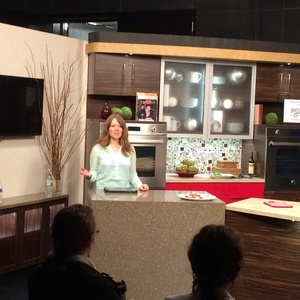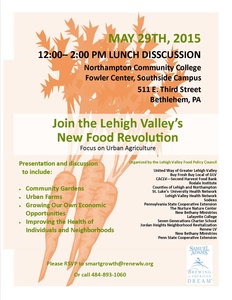 Allison Czap of Rodale Institute explains the importance of eating local organic produce.
Allison Czap of Rodale Institute explains the importance of eating local organic produce.
Lehigh Valley Food Policy Council
The Lehigh Valley Food Policy Council was formed as a recommendation of the Assessment Report: Lehigh Valley Local Food Economy developed as a part of the EnvisionLV process that created a regional sustainability plan funded by a $3.4 million HUD Sustainability Planning Grant.
As of June 2015 a founders team of the Lehigh Valley Food Policy Council was comprised of United Way of the Greater Lehigh Valley, CACLV, the Second Harvest Food Bank, Buy Fresh Buy Local of the Greater Lehigh Valley, Lafayette College, the Counties of Northampton and Lehigh, Penn State Cooperative Extension, Jordan Heights Neighborhood Revitalization, St. Lukes Hospital, Lehigh Valley Health Network, New Bethany Ministries, Nurture Nature Center, Sodexo, Rodale Institute and RenewLV. By the end of July 2015, CACLV was identified as the backbone organization of the food policy council.
The the cessation of the founders team and the formal creation of the Lehigh Valley Food Policy Council will be announced at an event September 24, 2015 from 4-6 p.m. at Sacred Heart Hospital in Allentown, PA.
The citizens of the Lehigh Valley have begun to map our local food system:
- Farms
- Farmers Markets
- Restaurants (serving locally grown food)
- Food Deserts/Grocery Stores
- Food Banks and Emergency Food Pantries
- Heathy Corner Stores
- Food-Related Non-Profits
Background on LV Food Policy Council
The Lehigh Valley chapter of Buy Fresh Buy Local developed an Assessment Report of the food economy as a part of the EnvisionLV effort and published it on November 7, 2013.
According to this assessment report which looked at the food system in a regional contex, the Lehigh Valley has lost 80 percent of its farms and 53 percent of it farmland since the 1930s. Farmland Preservation has successfully preserved 400 of the remaining farms to ensure a future for fresh local food in the economy. Penn State Extension contributes to the success of these farms through educational programs and support for these farms to remain viable businesses for Lehigh Valley.
The assessment report also states that locally grown food contributes an estimated $17 million annually to the local economy. If residents in the Lehigh Valley spent just $10 per week of their food budget on locally produced food, the local food economy would generate $186 million in economic activity. To address these issues and others relating to food access, the assessment proposed the following strategy:
"Establish a Food Policy Council comprised of diverse food system stakeholders to develop a comprehensive and coordinated approach to addressing issues of fresh food access and the local food economy."
The first meeting of the Lehigh Valley Food Policy Council was held Dec. 12, 2014, at Northampton Community College with more than 80 participants representing all aspects of the food system network in the Lehigh Valley. A presentation was made by Ann Palmer of Johns Hopkins School of Public Health. She started the food policy council of the Chesapeake Bay region, and highlighted the various ways that food policy councils could be structured. Since then, stakeholders and interested parties have gathered for lunch/discussions organized by RenewLV and funded by Samuel Adams, Brewing the American Dream that attracted up to 125 stakeholders attending on 1/29/15, 3/30/15 and 5/29/15. Topics covered have included growing the local food economy through supporting food and beverage entrepreneurship and joining the Lehigh Valley's new food revolution through focusing on urban agriculture.
The Assessment Report identifies loss of farmland as the biggest challenge facing the Lehigh Valley local food economy. RenewLV has established a farmland preservation committee to explore the tools available to preserve farmland and create recommendations for meeting the regional farmland preservation goals.



